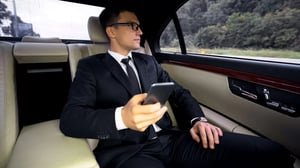The traditional view is that luxury is a universal concept that transcends age, sex, and nationality. Hence, luxury brands aim to create a timeless appeal that resonates with a broad audience.
While it may be easy to assume that all generations have similar luxury expectations and preferences, MODIV Mindset finds that luxury means different things to different age groups who possess different values.

Gen-Z (born between 1997-2012) prioritizes eco-friendliness, sustainability, and social responsibility.

Millennials (born between 1981-1996) value convenience, social experiences, and customizability.

Gen-X (born between 1965-1980) seek exclusivity, privacy, and unique offerings. Gen X feels the economic heat a bit more, but still finds the means to prioritize comfort and longer stays. They are also more likely to splurge on upscale hotels and fine dining experiences that are personalized. (Hospitality Investor).

Boomers (born between 1946-1964) desire comfort, familiarity, and authenticity. Boomers, statically more likely to be retired and less likely to be affected by rising debt costs, are willing to spend on premium travel experiences, including upscale accommodation.
It All Comes Down to Values
“Both millennials and Gen Zs often want to align themselves with brands that share their values,” said Marc Speichert, Chief Commercial Officer of Four Seasons. “For our brand, this includes our belief that true luxury is not about rigid, impersonal service.” (Skift).
Meanwhile, Peter Borer, The Peninsula’s longtime COO, states caution should be maintained when it comes to catering to the whims of younger travelers, arguing “luxury should inspire aspiration.” Modernity shouldn’t be the answer to every call. Core offerings remain timeless and sophisticated.
For example, Gen Zs generally show a greater willingness to explore health more holistically than just physical fitness, so “wellness” means something different to them. So the luxury idea of a spa may attract certain demographics, while putting off others.
Younger generations with disposable income are more often choosing to “do it all” rather than “own it all” - and hospitality brands should take note.
Arguing that luxury is actually a jumping point for “self-discovery”, Tina Edmundson, global brand officer, luxury and lifestyle brands, for Marriott International indicates “this shift away from materialism is all about guests looking for meaningful travel experiences that really speak to what's important to their inner selves.” (North Star Meetings Group).
The FWD Move: A Look Across Sectors
Multi-Day Tours and Activities:
Multi-day tour operators have seen recovery and growth above 2019 levels, and a growing demand for luxury and premium tours has emerged from the pandemic.
- The Nuance: Baby boomers may seek more traditional packaged tours and itinerary-based travels with upscale accommodations, fine dining, and exceptional service. On the other hand, younger generations may look for unique experiences that are curated towards their interests, needs, and values. Educational travel has gained popularity, with parents supporting immersive learning opportunities for their children.
- The FWD Move: Luxury tour operators can leverage new technologies such as augmented reality, virtual reality, and gamification to enhance the immersive experience. The multi-day tour sector is in the early stages of digital transformation, suggesting tremendous opportunities for innovation and digital growth. Similarly, the tours and activities sector is seeing rapid digital recovery, with many small operators trying to maintain their market share against the largest players.
Cruise Industry
The cruise industry is making a strong comeback, expected to exceed 2019 passenger levels in 2023. Adventure cruises, particularly luxury and premium adventure trips, are popular in the industry.
- The Nuance: Baby boomers may seek larger ships with more amenities and upscale accommodations, while millennials may look for smaller ships that cater to their unique interests and preferences.
- The FWD Move: Luxury cruise operators can differentiate themselves by offering unique and immersive shore excursions, curated dining experiences, and exceptional customer service. Brands should focus on catering to the evolving needs and preferences of North American travelers, the main source region for cruise passengers.
Car Rental Industry
The car rental industry was not as heavily impacted by the pandemic and has seen steady growth since 2020. Car rental search demand has significantly outpaced pre-pandemic levels in many countries, and pricing has softened in 2023, but remains high compared to pre-pandemic levels.
- The Nuance: Baby boomers may seek more traditional car rental options that provide luxury vehicles with exceptional service, while younger generations may seek more sustainable and eco-friendly options such as electric vehicles.
- Major car rental companies such as Enterprise, Avis Budget Group, and Hertz Global Holdings are focusing on fleet electrification, with partnerships with manufacturers like Tesla and BYD.
- The FWD Move: Luxury car rental brands should provide a mix of classic luxury services while introducing curated routes, eco-friendly options, and locally inspired recommendations.
Luxury hospitality has long been associated with extravagance, opulence, and exclusivity. However, what defines luxury may vary across different age groups and generations. With the rise of new technologies, changing consumer needs, and evolving cultural trends, luxury brands need to stay agile and adaptable to cater to the nuanced preferences of their diverse audiences.

